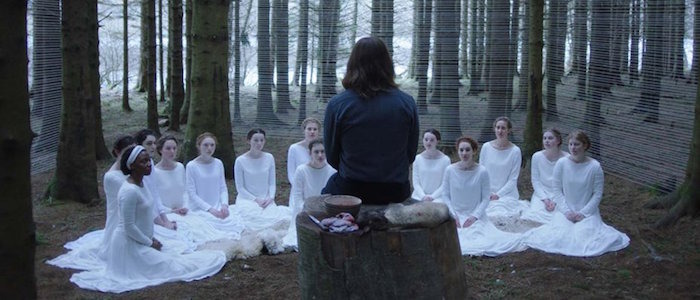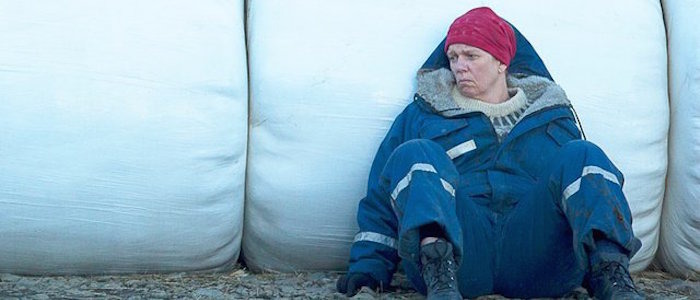The Unsung Gems Of TIFF 2019: Three Under-The-Radar Films You Should Know About
The festival scene rolls on past Toronto, with Fantastic Fest kicking off this week and New York Film Festival gearing up for next week. It's easy to focus on the big winners – Joker, Jojo Rabbit – and the losers – The Goldfinch, Lucy in the Sky – and completely lose sight of why these festivals exist in the first place. In a crowded media environment, film festivals represent one of the last bastions that provide platforms to emerging or under-the-radar filmmakers. They are a spot where a film, freighted with few expectations, can come out of nowhere and surprise unsuspecting viewers.
The following three films represent some of the best of this side of TIFF. Their journeys do not end at the festival, either. Unlike well-funded studio projects using TIFF as a launch pad for release, these films are all seeking U.S. distribution and will likely continue touring the worldwide festival circuit. Keep an eye out for them if they arrive at a fest near you.
Wet Season
In just his second feature, Wet Season, Singaporean director Anthony Chen establishes himself as a masterfully empathetic chronicler of irregular relationships. Here, it's between the teacher Mrs. Lim (Yann Yann Yeo), struggling with infertility while also sagging under the weight of carrying the emotional labor for her extended family, and her tender, introverted pupil Wei Lun (Jia Ler Koh). Each feels a hole of loss, loneliness and abandonment in their lives that the other can help plug.
The film develops not in grand gestures but in an accumulation of small, gentle moments. His attention to detail in everything from performance to shot composition gives Wet Season such an undeniable specificity that, paradoxically, it becomes applicable to situations far beyond the purview of the film. Taken together, Chen provides an experience that warms your heart in one scene and breaks it in the very next one. Still, even when considering its bittersweet moments, a necessary component for any film that wants to accurately portray the rollercoaster of human experience, Wet Season is a warm, enveloping blanket of compassion. The sweetness is simply overwhelming.
/Film rating: 8 out of 10
The Other Lamb
With cult films a dime a dozen these days, it takes a rare work to cut through the noise. Malgorzata Szumowska's The Other Lamb does just that. It's due in large part to the film succeeding across multiple fronts, not merely just as an exploration of a mysterious group organized around the deity of a charismatic Shepherd (Michiel Huisman). The cult makes for more of a background than a subject. Szumowska skips the what of the cult and gets immediately to the how and the why, which are far more interesting. Her interest lies not in what brought them to fall under Shepherd's spell but rather in what keeps them there.
Much of the connection is, yes, an authentic belief in their religious convictions. But Shepherd's prodigious breeding creates two tiers among the group – Wives and Daughters, the latter of which keeps the former around with the cult in the woods. Much of our understanding of how the group functions comes through the eyes of the protagonist, Raffey Cassidy's Sela, a Daughter who has no sense of identity or perspective that doesn't involve the group. Her coming-of-age story has the potential to alter all relationships and structures as power and sexuality entrances her ... but control and subjugation repels her. As told through Szumowska's highly symbolic aesthetic, The Other Lamb makes for a chilling glance at the strange pull that cults exert on their members and how their values imprint themselves on their members in irrevocable ways.
/Film rating: 8 out of 10
The County
Picture Three Billboards Outside Ebbing, Missouri – hear me out – minus the problematic elements and set in Iceland, and you've got something akin to what Grímur Hákonarson pulls off in his new film The County. It's all anchored in a riveting, urgent performance by Arndís Hrönn Egilsdóttir as Inga, a widowed farmer left to face the prospect that her husband died by suicide to leave her to pay their large debts to the local co-op. The more she comes to realize the extent of her financial predicament, the greater she discovers the "mafia-esque" tactics of the co-op to benefit themselves at the expense of the workers who power them. Faced with no other choice, she turns to the refuge of middle-aged women everywhere: essay-length Facebook statuses complaining about politics.
Inga's quest for justice extends far beyond the online realm, however, spilling over into real collective action to force accountability – or forge a new co-op altogether. Hákonarson expertly channels the populist fury of the working class as he, through the film's heroine, makes a case for how organizations designed to protect farm laborers should better resemble the people they represent and not the people who exploit them. Don't expect any inspiring schmaltz from The County, but for those looking to understand the global nature of the struggles faced by those who dare to resist all-encompassing economic organizations, this movie delivers the goods.
/Film rating: 8.5 out of 10



